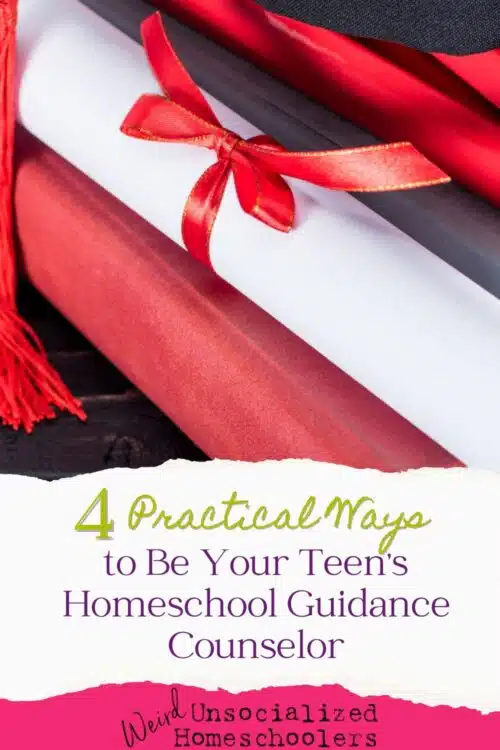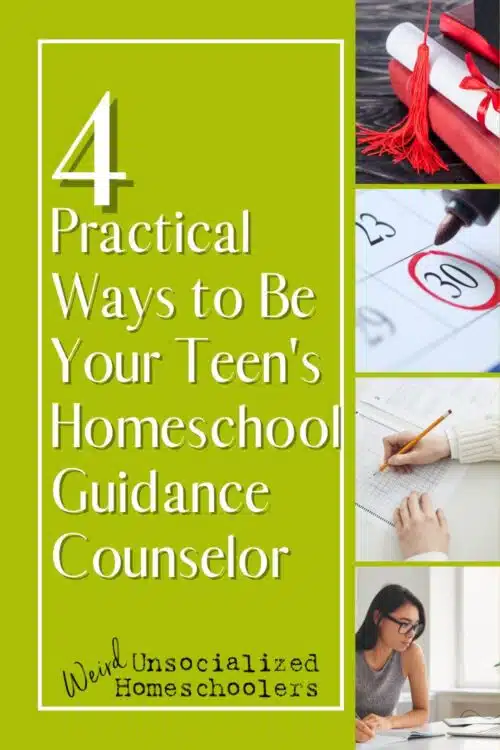4 Practical Ways to Be Your Teen’s Homeschool Guidance Counselor
Homeschooling parents wear many hats. While our primary role is that of teacher and facilitator, we may also play roles such as cafeteria lady, school janitor, or bus driver. One position we may not consider is that of their homeschool guidance counselor.
It is particularly important that we understand how to fill the role of homeschool guidance counselor once our teens reach high school.


Understanding Your Role as
Homeschool Guidance Counselor
A high school guidance counselor has many jobs, but the four primary responsibilities are guiding and helping students:
As a homeschooling parent, you’ll perform many of the duties of a guidance counselor naturally and without much extra planning or research. Others – particularly the college application process – can seem more daunting.
Practical Ways to Be Your Teen’s Homeschool Guidance Counselor
Stepping Into the Role of Homeschool Guidance Counselor
As I said, homeschooling parents will fill some of the guidance counselor roles naturally and without much further planning. However, sometimes all of the things we need to do to help our students prepare for college or career can be overwhelming. Use the following tips to guide you in your role of guiding your student as a one-on-one homeschool guidance counselor.
Help Your Teens Discover Their Strengths
No matter your student’s post-graduation plans, taking two or three personality and strength assessments can be a great way to identify possible educational and career paths. Many colleges use Gallup’s CliftonStrengths assessment. Another good option for homeschooling families is Thrively.

These types of assessments can help students identify their strengths, weaknesses, and areas of interest. Our strengths aren’t always our passions, so it’s important to help your teens look at both. Then, explore potential educational and career options in areas where your teen’s skills and interests intersect.
Provide Actionable Next Steps
Once you and your student have discovered some possible career paths to explore, help your teen take the next steps to investigate those possibilities. Some suggestions include:
- Talk to people who work in your teens’ areas of interest.
- Look at the skills and education required. (For example, my teen would love to run an animal rescue so a business degree would be a tremendous asset.)
- Ask around – you may not know anyone who works in your teen’s areas of interest, but you may be surprised who does. (For example, we discovered that a friend of a friend runs a local pit bull rescue.)
- Look for volunteer or internship opportunities.
Offer Input on Course Choices
As previously stated, one role of a guidance counselor is to help students choose the courses that will best prepare them for whatever post-graduation path they plan to take. There are some very effective steps that you can take as you take on the role of homeschool guidance counselor to help your teen in this area.
If your student is college-bound, look at the high school course requirements for colleges and universities that your teen is considering to make sure that you are meeting those requirements.
Don’t be afraid, however, to design your own courses based on your student’s interests, with college requirements in mind. For example, I had one Shakespeare-loving kid so we leaned heavily into his works when developing our high school literature course.

One thing I have heard through the homeschool grapevine is that colleges often note that homeschooled kids have a heavy focus on classic literature to a near-exclusion of more modern choices, so that’s something to keep in mind. (In other words, give your Harry Potter or Lord of the Rings aficionado room to enjoy their faves. Colleges are cool with that.)
If your student has more interest in trade school, the military, or going directly into the workforce, design their high school courses with those goals in mind. Ask around in your local homeschool community. We had an engineer homeschool dad who taught a CAD course (and others) to interested homeschoolers. One of them basically had a nice engineering job waiting for him when he graduated, thanks to the education he had already acquired.
Make Notes of Deadlines
Do some research to learn when and where your college-bound student can take college entrance exams and apply for scholarships or financial aid. For example, your high school junior will need to take the PSAT if he or she hopes to qualify as a National Merit Scholarship Finalist.

Most standardized tests, such as the SAT and ACT are taken during a student’s senior year. And, you and your student will need to complete the FAFSA application early during senior year to apply for financial aid and scholarships.
Your student can begin to apply for colleges during their junior year or in the summer before senior year. Check with the individual schools your student is interested in for specific deadlines.
I’m just going to gently suggest that there’s a time and place for making your teen responsible for his own deadlines and suffering the consequences of missing those deadlines – and these important junior and senior year dates are probably not it.
Take some time at the beginning of the school year (or at the end of their sophomore year) to jot down the dates on a shared family calendar – physical or digital. Then, make sure that both your student and her homeschool guidance counselor (that’s you!) are paying attention to them.
The culmination of you and your student’s homeschooling years together is a scary, exciting, joyful, bittersweet, busy time. You may have stepped back a bit as the teacher and moved into more of a facilitator role. Just don’t forget that you may need to pick up the homeschool guidance counselor role, especially in the last two years of high school.
Have you thought about your changing roles as a homeschooling parent? What guidance counselor tasks make you feel stressed?
You Might Also Like
- A Homeschool Health Course for High School
- Signs You’re Homeschooling a High Schooler
- 10 Tips to Help Easily Distractible Teens Focus
Kris Bales is a newly-retired homeschool mom and the quirky, Christ-following, painfully honest founder (and former owner) of Weird, Unsocialized Homeschoolers. She has a pretty serious addiction to sweet tea and Words with Friends. Kris and her husband of over 30 years are parents to three amazing homeschool grads. They share their home with three dogs, two cats, a ball python, a bearded dragon, and seven birds.






My kids have both graduated high school and one is a senior in college while the other is a junior. The most intimidating thing for me being their counselor was writing the counselor letter for the Common App. The challenge was writing something that was objective enough without sounding like “mom.”
My “funny” guidance counselor experiences for both my oldest. The oldest was really interested in chemsitry from a young age so we put lots of time, energy and money into the area. He did undergrad and post grad degrees in the area and seemed to be heading for an academic career which would have suited him. Then he decided he was done with chemistry and taught himself more programming and now works as a computer programmer. Oldest daughter didn’t know what she wanted to do, lots of things were possibilities but no real stand outs. She hated science but her dad said she needed to do one more year. I hit on psychology as a compromise – science enough for him, but non-science enough for her. Turned out that was her thing and she’s now working on her graduate degree. Looking forward to seeing how my guidance counselor efforts with my younger two pan out.